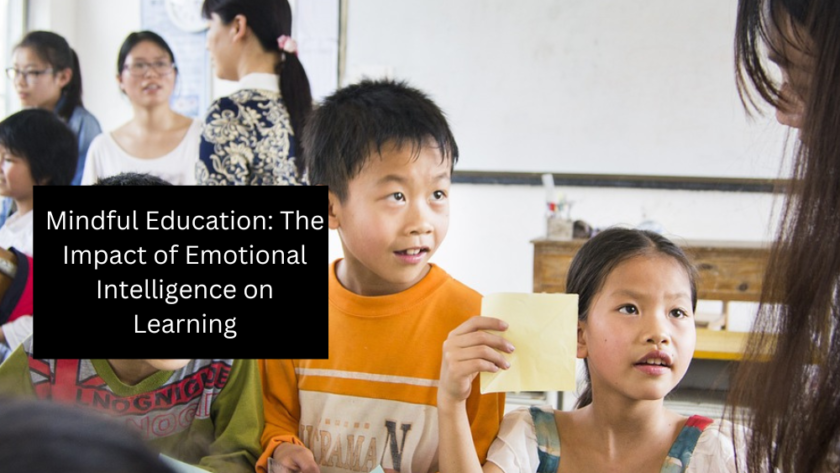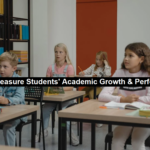In the ever-changing landscape of education, there has been a growing emphasis on developing not only academic skills but also emotional intelligence in students. This focus on emotional intelligence, also known as EQ, has become a vital aspect of mindful education.
Mindful education is a holistic approach to learning that integrates emotional intelligence into traditional academic curriculum. The concept of emotional intelligence was first introduced by psychologists Peter Salovey and John D. Mayer in 1990 and later popularized by author and science journalist, Daniel Goleman.
It refers to the ability to recognize, understand, and manage one’s own emotions, as well as the emotions of others. In recent years, there has been a significant shift towards incorporating emotional intelligence into the education system, as it has been shown to have a profound impact on student learning and well-being. Considering emotional intelligence can be a valuable asset in your career, career guidance counselors often recommend strengthening this skill set.
In this article, we will delve into the concept of mindful education and explore the influence of emotional intelligence on student learning, academic success, and overall personal growth.
1. Emotions Influence Learning more than Information
In the realm of education, it has long been understood that emotions play a significant role in the learning process. While the acquisition of information and knowledge is certainly important, research has shown that emotions have a profound impact on how effectively that information is absorbed and retained by learners. High emotional intelligence can pave the way for homework success by helping students manage frustration, stay motivated, and focus on completing tasks. When students are engaged and emotionally invested in their learning experience, they are more likely to be motivated, attentive, and receptive to new information. Conversely, when students are feeling stressed, anxious, or disengaged, their ability to comprehend and retain information is compromised. Therefore, cultivating emotional intelligence and fostering a positive emotional environment in educational settings is crucial for promoting effective learning outcomes.
2. Mindfulness Increases Emotional Intelligence
“Emotional intelligence is the ability to recognize, understand, and manage our own emotions while effectively navigating the emotions of others.” – Daniel Goleman
One practice that has shown promise in enhancing emotional intelligence is mindfulness. Mindfulness involves cultivating a moment-by-moment awareness of one’s thoughts, feelings, bodily sensations, and surrounding environment without judgment. Through regular practice, individuals develop the ability to observe and acknowledge their emotions without being overwhelmed by them.
This heightened self-awareness allows individuals to better understand their own emotional states and those of others, leading to increased empathy and compassion. Moreover, mindfulness exercises such as deep breathing and meditation can help regulate emotions, reduce stress, and improve overall well-being.
By incorporating mindfulness into educational curricula and providing students with the tools to cultivate emotional intelligence, educators can create an environment that fosters self-awareness, empathy, and effective interpersonal relationships, ultimately enhancing the learning experience and promoting holistic development.
3. Emotionally Intelligent Students have Better Relationships
Building strong and meaningful relationships is an essential aspect of personal and professional success. Research has consistently shown that emotionally intelligent students tend to have better relationships w. ith their peers, teachers, and even family members.
This is because emotional intelligence equips individuals with the skills and abilities to understand and manage their own emotions and effectively navigate and respond to the emotions of others. By being aware of their emotions and how they impact their interactions, emotionally intelligent students are more likely to engage in empathetic and respectful communication, resolve conflicts constructively, and establish positive connections with others.
These enhanced relationship-building skills not only contribute to a more harmonious and supportive learning environment but also prepare students for healthy and fulfilling relationships throughout their lives.
4. Social Skills are Critical for Success
Effective social skills are paramount for achieving success in various aspects of life. Whether in the workplace, academia, or personal relationships, individuals who possess strong social skills are more likely to excel and thrive.
These skills encompass a range of abilities, including active listening, effective communication, empathy, and collaboration. By honing these skills, individuals can effectively navigate social interactions, build meaningful connections, and foster positive relationships.
In professional settings, strong social skills enable individuals to collaborate effectively with colleagues, negotiate and resolve conflicts, and demonstrate leadership qualities. Furthermore, in academic environments, students with well-developed social skills can actively participate in group projects, engage in productive discussions, and establish positive rapport with their peers and teachers. Ultimately, mastering social skills is not only crucial for personal growth and fulfillment but also enhances one’s ability to succeed in various spheres of life.
5. Emotionally Intelligent Students are Resilient
In the realm of education, the concept of emotional intelligence has gained significant recognition due to its profound impact on students’ learning and overall well-being. One crucial aspect of emotional intelligence is resilience, which refers to an individual’s ability to adapt and bounce back from challenging situations. Emotionally intelligent students possess a strong sense of self-awareness, allowing them to recognize and understand their emotions effectively.
This self-awareness enables them to develop coping mechanisms and strategies to effectively manage stress and setbacks, ultimately leading to increased resilience. When faced with academic challenges or setbacks, emotionally intelligent students are more likely to view them as opportunities for growth rather than insurmountable obstacles.
They exhibit a resilient mindset, persisting in their efforts, seeking assistance when needed, and ultimately achieving success. By fostering emotional intelligence in the educational setting, educators can empower students to develop resilience, equipping them with invaluable skills to navigate the complexities of academia and beyond.
Read: Beyond Classroom Walls: MSc Psychology Distance Learning Advantages
6. Build Emotional Intelligence Through Mindfulness
Promoting emotional intelligence in students can be achieved through the practice of mindfulness. Mindfulness involves cultivating a state of present-moment awareness, where individuals observe their thoughts, emotions, and sensations without judgment. By incorporating mindfulness into education, students can develop a deeper understanding of their inner experiences and cultivate greater emotional intelligence.
Through mindfulness practices such as deep breathing exercises, guided meditation, and body scans, students can learn to regulate their emotions, enhance their self-awareness, and develop empathy towards others.
Mindfulness also helps students to develop better focus and attention, which in turn improves their ability to manage stress and navigate challenging situations effectively. By integrating mindfulness practices into the educational curriculum, educators can empower students to build emotional intelligence, leading to enhanced well-being and academic success.
7. Teachers play a Crucial role
Teachers play an indispensable role in the development of students’ emotional intelligence. Their guidance and support have a profound impact on how students navigate their emotions, understand themselves and others, and ultimately thrive in their personal and academic lives.
Through their expertise and dedication, teachers create a safe and nurturing environment where students can explore and express their emotions, learn effective communication skills, and develop healthy coping strategies. By fostering a positive and inclusive classroom culture, teachers encourage students to embrace their emotional experiences, validate their feelings, and practice empathy towards their peers.
Furthermore, teachers serve as role models for emotional intelligence, demonstrating self-awareness, self-regulation, and effective interpersonal skills in their interactions with students. Their commitment to fostering emotional intelligence not only supports students’ overall well-being but also equips them with essential life skills that will benefit them throughout their educational journey and beyond.
8. Mindful Education Enhances Overall Well-Being
A mindful education approach goes beyond traditional academic learning, as it recognizes the interconnectedness of mental, emotional, and physical well-being. By incorporating mindfulness practices into the curriculum, students gain valuable tools to manage stress, enhance focus, and improve overall well-being.
Mindful education encourages students to cultivate self-awareness and self-compassion, empowering them to navigate challenges with resilience and adaptability. Through mindfulness-based activities, such as breathing exercises and guided meditations, students develop a greater sense of presence and a deeper understanding of their emotions.
This not only enhances their ability to regulate their own emotions but also fosters empathy and understanding towards others. By integrating mindfulness into education, we are equipping students with lifelong skills that positively impact their well-being, both in and outside the classroom.
Conclusion
In conclusion, emotional intelligence plays a significant role in the learning process. By incorporating mindful education techniques, educators can help students become more self-aware, empathetic, and resilient, ultimately leading to improved academic performance and personal growth. Both educators and students need to prioritize emotional intelligence in the classroom to create a positive and productive learning environment. Bethany High School could empower its students by integrating social-emotional learning programs to cultivate emotional intelligence and prepare them for future success. As we continue to navigate the ever-changing landscape of education, let us not forget the importance of emotional intelligence and its impact on the holistic development of our students.
Author’s Bio:
Zeeva Usman is a content marketing manager at Peter and Petra. She is leading the remote working training program at Second Adam Church and a content marketing specialist at Church Marketing Agency. When not working she loves to worship and sing for the Lord Jesus.




